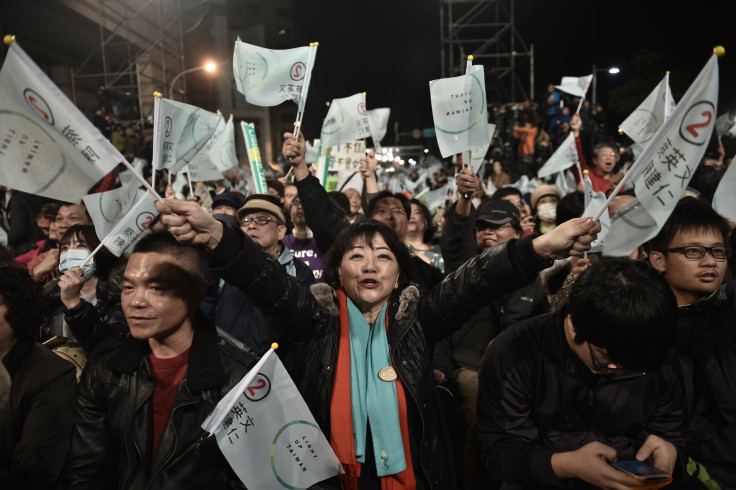Taiwan Elections: Opposition Leader Tsai Ing-Wen Elected Country's First Female President

UPDATE: 9:15 a.m. EST — The U.S. State Department congratualated Tsai Ing-wen on her victory, cautioning against anti-mainland sentiments. “We share with the Taiwan people a profound interest in the continuation of cross-Strait peace and stability,” the State Department said in a statement. “We look forward to working with Dr. Tsai and Taiwan’s leaders of all parties to advance our many common interests and further strengthen the unofficial relationship between the United States and the people on Taiwan.”
UPDATE: 7:55 a.m. EST — Opposition candidate Tsai Ing-wen won a landslide victory in Taiwan’s presidential election Saturday, making her the island’s first female president. With almost all the votes counted, the 59-year-old lawmaker was ahead at 56.2 percent, while Eric Chu, leader of Taiwan's ruling party Kuomintang, who conceded defeat earlier, was lagging behind at 30.9 percent.
Original story:
Eric Chu, leader of Taiwan's ruling party Kuomintang (KMT) conceded the election held Saturday. With more than half the votes counted so far, Tsai Ing-wen, leader of the Democratic Progressive Party (DPP), was ahead with 58.1 percent, according to live counts by local news networks, while Chu, the presidential candidate from the ruling China-friendly KMT was trailing at 32.5 percent.
Taiwan’s departing president Ma Ying-jeou, who defeated Tsai in the last presidential elections held in 2012, is not eligible for a third term.
The preliminary results, which indicate that the scholar-turned-politician Tsai is likely to become the self-ruled island’s first female president, may test Taiwan’s precarious ties with China.
Support for the DPP, which has traditionally leaned in favor of independence from mainland China, and the 59-year-old leader Tsai, has increased significantly since 2014, when hundreds of student-led demonstrators occupied parliament for more than three weeks to protest trade pacts negotiated with China by the pro-Beijing KMT.
Ma’s critics have voiced their opposition to warming ties with the mainland, even as the island’s stagnating economy fueled frustration that the trade pacts had failed to benefit ordinary Taiwanese citizens.
“Taiwan needs change, economically and politically,” a 65-year-old voter in Taipei, identified only as Lee, told Agence France-Presse. “The government leaned too easily on China.”
The Chinese government still regards Taiwan as part of its territory, even though the two have been politically divided since 1949. Beijing has threatened to use military force against the island if its leaders declare formal independence — a move that may also worsen ties between China and the U.S., which is obligated under the Taiwan Relations Act to come to the aid of the island.
“Tsai Ing-wen doesn’t want this to blow up. Washington doesn’t want this to blow up; Beijing doesn’t want this to blow up. So why should it blow up?,” Shelley Rigger, a professor of East Asian politics at Davidson College in North Carolina, told the New York times, adding that even if Tsai is elected, relations with China would remain stable.
© Copyright IBTimes 2024. All rights reserved.






















